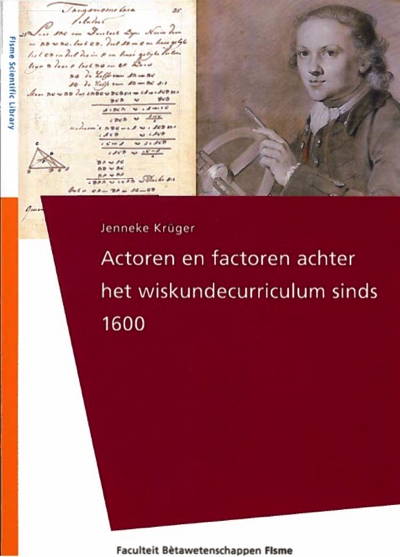Actoren en factoren achter het wiskundecurriculum sinds 1600

|
Actoren en factoren achter het wiskundecurriculum sinds 1600
Jenneke Krüger Proefschrift 2014, Utrecht University |
Op welke manier ontstonden er in het verleden curricula? Een beschrijving en analyse van drie historische voorbeelden. Vernieuwingen van het wiskundecurriculum gaan vaak samen met heftige discussies en inbreng van veel verschillende partijen. Op welke manier ontstonden in het verleden nieuwe wiskundecurricula? Mogelijk bieden de vernieuwingsprocessen uit het verleden referentiemateriaal voor opinies en plannen met betrekking tot actuele wiskundecurricula.
In what way were mathematics curricula designed and developed in the Netherlands in the past? What was the role of the actors involved; what factors were very influential? These questions form the subject matter of this thesis. Possibly, knowledge of past processes could result in a more objective debate and a better balanced design and development of future mathematics curricula. We selected three historical cases on mathematics education, which were at the time considered a success. As much as possible data were collected from historical sources. To structure and describe the data, concepts from curriculum theory are used. One result is an extensive description of the mathematics curriculum of the Dutch Engineering School in the 17th century, of the Foundation of Renswoude in Utrecht in the 18th century and of the higher school for citizens (HBS) in the 19th century. Furthermore, a comparison of the three historical examples shows that for the intended curriculum there always was an influential initiator, with a clear aim, who was surrounded by capable people. Those people translated the ideals and aims into a viable formal curriculum. In the implementation the qualities of the mathematics teachers were considered extremely important; including education and knowledge relevant to the goals of the curriculum and pedagogical-didactical skills. The teachers were usually part of a network with relatively short connections, in which monitoring and accountability were normal procedures. The level of specification of the formal curriculum might differ; mathematics teachers determined the content and chose the learning materials and learning activities. Transition demands from the next stage, study or profession, were an important influence on the mathematics curriculum. Exams were an essential component in each curriculum, but not necessarily final exams. A preliminary analysis of the development and first period of implementation of the current mathematics curriculum in higher secondary school, shows that similar factors and actors were influential, however in different circumstances the influence appeared to be more negative. Based on knowledge about important factors and actors in mathematics curricula in the past, it is recommended that when designing a new mathematics curriculum, care is taken of matters such as the following. · An interpretation of ideals into a formal curriculum that is viable within the given conditions. · Clarity with regard to the main aims and other explicit and implicit aims; conflicts between aims should be solved as soon as possible. · The curriculum combines substantial content with modern digital learning materials. · Mandatory in-service training for all mathematics teachers, taking into account the individual level of knowledge and skills. · Selection of subject matter, learning materials and learning activities should first and for all be the responsibility of the mathematics teachers. · Sufficient financial means, taking into account the required in-service training, time and space for consultation between teachers, combined with a smart organisation. · A smart organisation in secondary education includes networks of teachers, both inside the school and between schools and with connections to primary and higher education.
- Krüger, J. (2014). Actoren en factoren achter het wiskundecurriculum sinds 1600 (PDF), Faculty of Sciences, Freudenthal Institute (pp. 550). Utrecht: Utrecht University.
- Krüger, J. (2014). Wiskundecurricula revisited Wiskundecurricula revisited (PDF) Tijdschrift voor Didactiek van de Beta-wetenschappen, 31(1), 31-50
- Krüger, J. (2021). Wiskundeonderwijs in havo en vwo – waartoe? Blog op Website NVvW


